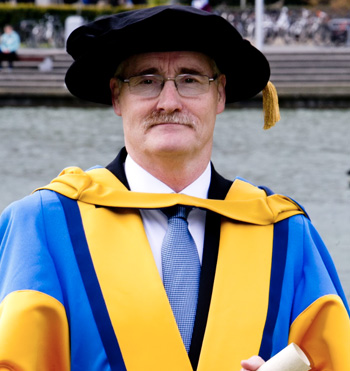Victor Laing
UNIVERSITY COLLEGE DUBLIN
HONORARY CONFERRING
Monday, 25 April 2016 at 11.30 am
TEXT OF THE INTRODUCTORY ADDRESS DELIVERED BY DR CONOR MULVAGH, School of History on 25 April 2016, on the occasion of the conferring of the Degree of Doctor of Laws, honoris causa on VICTOR LAING.
President, distinguished guests, ladies and gentlemen,
 Today we honour the work and national contribution of Victor Laing, Commandant (retired) and former Officer Commanding of Military Archives in the Irish Defence Forces.
Today we honour the work and national contribution of Victor Laing, Commandant (retired) and former Officer Commanding of Military Archives in the Irish Defence Forces.
Victor has not always been an archivist as his military title might suggest. He joined the Irish Defence Forces as a cadet in 1974 and received his commission in 1976. He was posted to the 4th Infantry Battalion, Southern Command. In 1983, Victor was posted to the Quartermaster General’s Office and thence to the office of the Chief of Staff. He completed two tours, both to the Lebanon, as part of UNIFIL: 1980-81 and 1985-6. On his second tour he was a part of UNIFIL HQ.
In 1986, Victor’s transition to archives began when he was appointed 2 i/c of Military Archives and posted to Cathal Brugha Barracks in Dublin. Following the unexpected and early death of Victor’s colleague and friend, Peter Young, Officer Commanding Military Archives in 1999, Victor rose to the challenge of taking over Peter’s command. Victor was immediately appointed Officer Commanding of Military Archives upon Peter’s unexpected death. Victor continued in this role right the way through until his retirement in 2012.
Academically, Victor built a BA in History and Classical Civilisations from NUI Galway when, in 1988, he became one of the first army officers in Ireland to undertake professional archival training. In 1988, two years after he began in archives, Victor was awarded a Higher Diploma in Archival Studies here at UCD.
The archivist’s is a triple role. On the one hand, the archivist is a preserver, guarding the records and papers under his or her custody. Secondly, the archivist frequently works on acquisition of new papers. Finally, and this is the side of archivistics which has taken the most monumental leap in recent years, the archivist is on the front line of providing scholarly and public access to documents.
All archivists do their duty in preserving records – in our country where the destruction of the Four Courts in 1922 left such a gaping and literal hole in our state papers, this duty is all the more apparent.
Beyond preservation and acquisition, it is safe to say that Victor Laing has been a true pioneer in the field of Irish Archival access. Central to Victor’s work has been a military efficiency both in digitisation of collections under his control.
As Officer Commanding Irish Military Archives, Victor presided over one of the most remarkable and extensive archival digitisation projects in the history of the state. The Bureau of Military History is a collection of 1,773 witness statements and associated documents and recordings collected by the State between 1947 and 1957.
The Bureau was locked away in the Department of An Taoiseach for some forty-five years after the last statement was collected. In 2001, the Bureau was transferred to Military Archives so as to prepare it for release into the public domain. A team of archivists and support staff, under Victor’s direction, launched the collection in March 2003. Not satisfied with this feat of cataloguing and preservation, a digitisation project ensued, resulting in the 2012 online, free, and open access release of 36,000 pages of records.
In what Victor achieved with this, he bravely chose not to follow global trends. Internationally, bigger and better-funded archives were resorting to subscriptions, paywalls, and corporate collaborations in modernising access to their collections. In the true spirit of public service, Victor succeeded in making a revolutionary act in the field of public history. I would argue, and I believe it is not an overstatement to say, that his achievement remains one of the most incredible feats of vision, perseverance, and commitment in Irish archival history.
It is fitting that, in honouring contributions to public life in the context of the decade of centenaries today we honour two archivists – the other being Catriona Crowe – of considerable standing. As an institution that not only has its own archive, containing within it many of the key personal and organisational papers which underpin research into Ireland’s revolutionary decade, but which also teaches in the field of archivistics through our School of History, that we should acknowledge the elemental but too often unsung work of archivists.
Military Archives continues to grow from strength to strength, building upon the foundations and ethos Victor fostered. Online, the Bureau of Military History has made way for the Military Service Pensions Collection, the 1922 Military Census, and other digitisation projects which have maintained Military Archives’ standing as a world leader and trailblazer in opening access to archives online.
In a literal sense, the foundations laid by Victor have led to major developments. Later this month, under Victor’s successor, Commandant Padraig Kennedy, a new building to house the collections and brand new reading and consultation rooms for Military Archives will be formally opened. This project has been many decades in the planning and Victor deserves no small amount of the credit for keeping the torch of this project lit in the years prior to its activation
Colleagues and friends, it is my great honour to now propose for the Degree of Doctor of Laws, honoris causa, Commandant Victor Laing:
Praehonorabilis Praeses, totaque Universitas,
Praesento vobis hunc meum filium, quem scio tam moribus quam doctrina habilem et idoneum esse qui admittatur, honoris causa, ad Gradum Doctoratus in utroque Jure, tam Civili quam Canonico; idque tibi fide mea testor ac spondeo, totique Academiae.